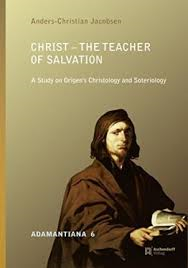Jacobsen, Christ – Teacher of Salvation: A workshop report on the second Colloquium Adamantianum
The second Colloquium Adamantianum revolved around the latest book by Prof. A.-C. Jacobsen, Christ – Teacher of Salvation. Below, you can read about the different papers, which addressed various key topics of Jacobsen’s study and its place in classical and contemporary Origen scholarship.

Jacobsen, Christ – Teacher of Salvation on the second Colloquium Adamantianum
The second Colloquium Adamantianum, organized and hosted by the Cambridge Centre for the Study of Platonism, revolved around the latest books by Prof. Anders-Christian Jacobsen, Christ – Teacher of Salvation. A Study on Origen’s Christology and Salvation, which appeared in the Adamantiana series of monographs and essay collections on the first major Christian Platonist in 2016. At the centre of Jacob’s rich and inspiring study is the notion of God’s accommodation and pedagogy in Christ.
Douglas Hedley (Cambridge) highlighted the significance of Jacobsen’s work in contemporary Origen scholarship, also outlining the role of Christ as an image and symbol of the divine in a Platonist account of reality as God’s sacrament. Anders-Christian Jacobsen (Aarhus) himself provided an introduction to his important study, giving a survey of Origen’s system of Christian Platonism. Just as Christ adjusts his teachings to the intellectual maturity of the fallen souls, Origen follows the Christological principle of accommodation in his more popular homilies and his more demanding philosophical and exegetical writings. Still, the Alexandrian is shown to hold a consistent systematic view of God, world and man. It informs a Christology which fuses the Christian Platonist’s own key conviction of Christ as the embodiment of divine pedagogy with the biblical notions of sacrifice and atonement.
The subsequent papers addressed various key topics of Jacobsen’s study and its place in classical and contemporary Origen scholarship as well as its importance to the Alexandrian’s reception history. Christian Pelz (Bochum) discussed the author’s innovative methodology of finding Christological unity in the baffling diversity so characteristic of the many different genres of Origen’s manifold work which consists of philosophical treatises and exegetical commentaries written for the learned and homilies given to the less advanced. Christian Hengstermann (Münster) and Daniel Tolan (Cambridge) explored the key concepts of Origen’s metaphysics and anthropology, i.e. Christ’s ἐπίνοιαι as modes of his redemptive pedagogical accommodation and his in-dwelling in the ἡγεμονικόν of the soul respectively. Adrian Mihai (Cambridge) emphasized the importance of the hierarchical order of the cosmos for Origen’s Christian metaphysics in which the souls come to sojourn in ever higher realms of a seven- or eight-level physical cosmos in the process of redemption. Ryan Haecker (Cambridge) gave an in-depth account of Jacobsen’s systematic reading of Origen which hinges upon the inner logic of the Logos’ mediation between the divine and the human. Three papers by Bogdan Deznan (Bucharest), Marilyn Lewis (Bristol) and Samuel Kaldas (Syndey) stressed the importance of Jacobsen’s depiction of Origen’s Christology and philosophical system to Cambridge Platonist scholarship. While Origen’s views of the Christ soul’s incarnation and his kenosis are key to a proper understanding of the Christology of Henry More and Hallywell, his notion of freedom as commitment to divine goodness can be seen to inform Ralph Cudworth’s Christian libertarianism.
Professor Jacobsen provided penetrating responses to the papers, expanding upon key issues raised by his book such as the ἡγεμονικόν in Christ and the redeemed soul, the metaphysics of the souls’ descent and ascent as well as the role of corporeality in Origen’s Christology. The third Colloquium Adamantianum, which will focus on Ilaria Ramelli’s work on Origen, will take place on 8th December 2018.
Christian Hengstermann